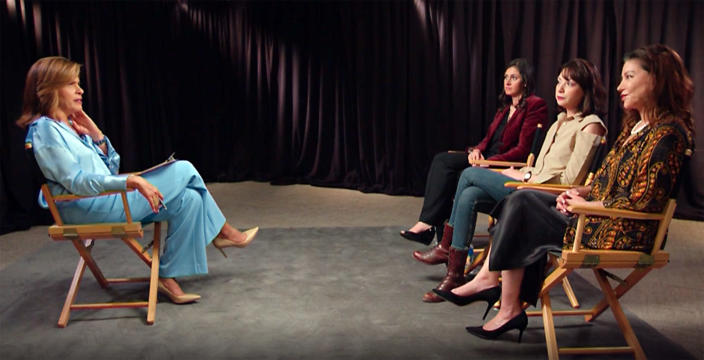As women and girls continue to protest and challenge the government in Iran following the death of Mahsa Amini, women across the world are joining in demonstrations and speaking out.
TODAY co-anchor Hoda Kotb spoke with three women of Iranian descent who said they feel compelled to give a voice to the voiceless in an interview aired on Oct. 19.
“What’s going on in Iran now is unprecedented. And it’s been brewing … for a long time,” said Nina Ansary, an Iranian–American historian and author. “But what’s happened now with the younger generation is joining in the protests. This is something that had not happened before.”
Protests broke out in Iran in September following the death of 22-year-old Amini. Amini died while in custody of Iran’s morality police, who arrested her in the capital of Tehran on Sept. 13 for allegedly violating the country’s strictly enforced dress code, NBC News reported.
Three days after her arrest, she was dead. Police have said Amini became ill and fell into a coma, but her family has said witnesses told them she was beaten by officers, NBC News reported.
The Iranian Legal Medical Organization, which describes itself as independent but is part of the country’s judiciary, said in a report released on Oct. 7 that Amini died of multiple organ failure.
Young women have been leading the protests in Iran. Videos shared on social media have shown hundreds of young women marching in the streets, taking off their hijabs and cutting their hair over the past few weeks. Ansary called the young women “the faces of courage.”


“I wish I had their courage at that age. But it just goes to show you, they’re messing with the wrong generation,” Ansary said. “This generation is not going to back down.”
“There are tremendous risks to them — arrest, torture, killing,” Ava Majlesi, associate professor of political science at Rutgers University, added. “But they’re still out there.”
Nasrin Sheykhi, a political cartoonist, told Hoda that women all over the world have joined in solidarity with protesters in Iran. “Other women, all over the world, they’re joining to this kind of movement to cut their hair,” Sheykhi said. “And they say, ‘We are with you.'”
Ansary, 56, said it takes a “tremendous amount” of courage and resilience for these women to take to the streets under Iran’s regime. Since 1979, women in Iran have been required to wear a headscarf and loose clothing while in public.
“It just shows the depth of desperation on the part of the Iranian population,” Ansary said. “This is the culmination of 43 years of a regime whose legacy to date has been one of egregious human rights violations.”
Ansary recalled living in Iran before the cusp of the 1979 Iranian Revolution, when she remembered seeing women wearing both hijabs or headscarves and modern clothing.
“When you were walking through the streets of Tehran, the capital city, you honestly felt like you were walking in Paris,” she said. “It’s really unfortunate, where we were and where we’ve ended up.”
Majlesi, 40, shared that the last time she was in Iran, around the age of 13 or 14, about two inches of her leg was showing — unbeknownst to her.
“Someone approached me and said, ‘You’d better cover up,'” she said. “It was crazy to me. But I did what I was told and, you know, pulled down my coat and pulled up my sock.”
Hoda asked when the women felt their lowest while watching what is happening in Iran. Ansary said seeing images of the morality police “beating up young children.”
“As a mother, I literally want to fly there and hug these children,” she said, getting emotional. “It’s just very difficult to watch. And it’s even more difficult to watch that this regime is getting away with this. And no one is stopping them.”
Sheykhi, 33, said she also felt the lowest while seeing those images, and that she wished she could be on the streets with the protesters in Iran.
“At least I could die, but I knew what I’m dying for,” Sheykhi said.
Ansary added she felt “so helpless here,” but that she believed tensions had reached a boiling point.
“Iranian civil society has reached the end of their road,” she said. “There’s no going back. And you can feel it this time.”
This article was originally published on TODAY.com




